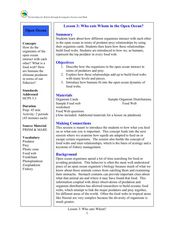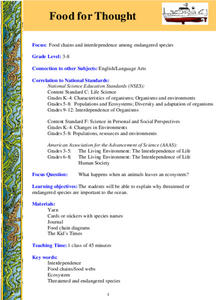Consortium for Ocean Science Exploration and Engagement (COSEE)
Plankton to Penguins: Antarctic Food Web
A well-written lesson plan, second in a series of four, gets high schoolers exploring how the Antarctic food web is impacted by climate change and the associated melting of polar ice sheets. It begins with a PowerPoint presentation about...
Consortium for Ocean Science Exploration and Engagement (COSEE)
Arctic Smorgasbord
Though the walrus spends roughly one third of its time on land, it eats organisms that live on the bottom of the ocean. The first in a series of five, the lesson uses a variety of plant and animal cards to have scholars build an arctic...
NOAA
Build Your Own Ocean Ecosystem
Hold the sea in the palm of your hand! Amateur oceanographers work together to create models of an ocean ecosystem in the sixth and final installment in a series. Raise awareness of global ocean health issues through guided research,...
Curated OER
Food Web Mystery
Students describe typical marine food webs, and explain why food is generally scarce in the deep-ocean environment. They discuss reasons that seamounts may support a higher density of biological organisms than would appear to be possible.
Curated OER
Rocky Shore Food Web Drama
Students explore food chains. In this ecosystem lesson, students discover how plants and animals rely on each other for survival. Students research the rocky shore ecosystem and create a skit representing the ecosystem.
Curated OER
A Coastal Arctic Food Web
Students create a food web of the arctic ecosystem. In this biology lesson, students explain how global warming affects this ecosystem. They explain how losing a species affects the entire community.
NOAA
Chemosynthesis and Hydrothermal Vent Life
What's life like in a hydrothermal vent? Find out in part five of a 13-part series. Learners journey to one of the harshest environments on the planet, the hydrothermal vent, to learn about the creatures that survive the extreme...
Curated OER
7th Science Quiz
This seventh grade life science quiz has a professional appearance and well-written multiple-choice questions. However, it seems to cover too broad a variety of biology topics for only 15 questions to fully assess. There is one question...
NOAA
Through Robot Eyes
How do robots assist ocean explorers in collecting data and images? The final installment in a five-part series has science scholars examine underwater images collected by robots and identify the organisms shown. Groups then calculate...
NOAA
Deep-Sea Ecosystems – Entering the Twilight Zone
Imagine an ecosystem without any light or oxygen, where living things convert carbon dioxide into food. This ecosystem is thriving and might just be the largest ecosystem on our planet, yet we know very little about it. The lesson...
Curated OER
Who Eats Whom in the Open Ocean?
Students examine how organisms interact with one another in the ocean. In this science lesson, students discuss predators and prey in the ocean. Students discuss food webs and how organisms interact with each other.
Ask a Biologist
It’s a Plankton Eat Plankton World
For as small as they are, plankton sure play an enormous role in maintaining marine ecosystems. Dive into an investigation of these tiny organisms with a hands-on life science activity in which children cut out pictures of sea...
NOAA
Animals of the Fire Ice
When the sun's rays can't reach the producers in a food web, where does all the energy come from? Extreme environments call for extreme food sources. Young scientists investigate creatures that appear to get their energy from methane...
NOAA
Deep-Sea Ecosystems – Life is Weird!
A pool of brine in the deep sea can be up to four times as salty as the surrounding sea water. The deep sea ecosystem relies on chemosynthesis and the organisms that live there are often strange to us. The lesson focuses on researching...
Curated OER
Food for Thought
Young scholars explore the food chains in a variety of ecosystems and its relationship to the survival of threatened or endangered marine animals or fish in the ocean. The interdependence of the species is investigated in this lesson.
Howard Hughes Medical Institute
Modeling Trophic Cascades
In the ecological game of who eats who, one small change can have a big impact! Individuals create food chains in an array of ecosystems, then determine what happens to organisms in the chain when one organism changes its feeding...
Curated OER
Introduction to Ocean Grazers
Learners explore biology by creating a poster with classmates. In this oceanography lesson, students identify the importance of coral reefs to the ocean's ecology and examine a food web of ocean animals. Learners define a list of...
American Museum of Natural History
Dive Into Worlds Within the Sea
Make connections between ocean organisms. Individuals explore three different ecosystems in the ocean. With an online interactive, they learn how different organisms depend upon each other. Learners first answer questions to connect...
American Museum of Natural History
Dive Into Worlds Within the Sea
The ocean is a series of ecosystems within an ecosystem. Learners dive into an exploration of ecosystems in an interactive lesson. They identify connections between organisms by following leading prompts within the lesson. The resource...
Curated OER
A House for Me- Ocean Environments
Students explore ocean environments. In this ocean environment instructional activity, students identify the things ocean animals need for survival. Students use KWL charts and search the Internet collecting information about ocean...
Curated OER
Food for Thought
Students understand the importance of each member of a food chain through a game. In this food chains lesson, students receive background information and then play a game to simulate what happens in the food chain of an endangered...
Curated OER
Jelly Critters
Pupils compare and contrast three different organisms that are considered gelatinous zooplankton. They describe how they fit into marine food webs.
Curated OER
Where's Dinner?
Upcoming marine biologists consider a list of organisms residing near the Lost City hydrothermal vents and construct a food web. They compare the food web to that of a cold seep community, of which they should have previous knowledge....
Curated OER
Along Our Coast
Students explore the coast lines of Florida. They examine the benefits of estuaries and examine the estuary systems found along the coast. Students research and construct a saltwater food web.

























